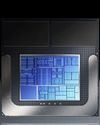WHILE MANY IT departments grapple with big data, IBM says it has the smallest data in the world: one bit on one atom.

Researchers at IBM’s Almaden lab in San Jose, California, have written and read a bit of data on a single atom using magnetism, a feat they say is a world first. It could lead to storage that’s hundreds of times denser than anything available now, able to hold the entire Apple iTunes library of 35 million songs on a device the size of a credit card, the company says.
Much denser storage could mean smaller phones, PCs, and even data centers in the future.
Current hard-disk drives use about 100,000 atoms to store a bit. Other scientists have used single atoms for storage before, including in experimental devices that used the atoms’ location to store data. But magnetic storage, the technique already used in tapes, disk drives, and flash, has the advantage of being solid state, so it doesn’t require moving atoms around, said Christopher Lutz, the nanosciences researcher who led the IBM project.
Denne historien er fra April 2017-utgaven av PCWorld.
Start din 7-dagers gratis prøveperiode på Magzter GOLD for å få tilgang til tusenvis av utvalgte premiumhistorier og 9000+ magasiner og aviser.
Allerede abonnent ? Logg på
Denne historien er fra April 2017-utgaven av PCWorld.
Start din 7-dagers gratis prøveperiode på Magzter GOLD for å få tilgang til tusenvis av utvalgte premiumhistorier og 9000+ magasiner og aviser.
Allerede abonnent? Logg på

Private Internet Access: A low-price, high-value VPN for everyone
This veteran VPN shows it can still hang with the best.

Hands-on: Kensington's first Thunderbolt 5 dock is built for the future
Thunderbolt 5 is here...but you'll need more than just this well-built Kensington dock to take advantage of it.

Tested: Intel's Lunar Lake chip wants you to forget Qualcomm laptops exist
Great battery life, mediocre performance, surprisingly decent gaming: That is how Intel's Lunar Lake chip stacks up.

7 laptop habits that coax the most out of your battery
Don't send your laptop into an early grave.

WordPad is gone from Windows 11. Here's how to bring it back
With the arrival of Windows 11 version 24H2, WordPad is officially gone. Want to keep using it? You're in luck.

Hackers know your social security number. Here's how to stay safe
Thanks to a multitude of data leaks, your most sensitive information is now easily accessible to the world.

20 insanely useful Windows 11 keyboard shortcuts I use every day
After so many years, I'm still discovering new keyboard shortcuts.

WHAT THE HECK IS AN NPU, ANYWAY? HERE'S AN EXPLAINER ON AI CHIPS
ALL PCS WILL SOON HAVE NEURAL PROCESSING UNITS. HERE'S WHAT THAT MEANS FOR YOU IN SIMPLE TERMS.

WINDOWS 11'S 2024 UPDAATE: 5 BIG CHANGES I REALLY LIKE (AND MORE)
WINDOWS 11'S ANNUAL UPDATE IS ROLLING OUT OVER THE NEXT FEW WEEKS.

Hackers are using AI-generated code for malware attacks
Two separate attacks have been spotted using code that was probably written by artificial intelligence.